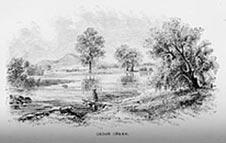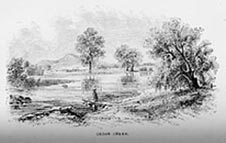Collection number: MC 111
Size: 1 box
(0.33 cu.ft.)
About John Henry Jenks, 1823-1864
John Henry Jenks, son of Oliver A. Jenks and Eliza Harper Brown Jenks, was born in North Brookfield, Massachusetts on June 10, 1823. He married Almina Crawford of Oakham, Massachusetts. Two of their three children, Flora (b.1854) and Henry (b.1860), survived infancy. Jenks settled in Keene, N.H. where he was employed as a shoemaker, store clerk, and merchant.
On August 28, 1862, Jenks enlisted for service in the 14th New Hampshire Volunteer Infantry. The following month, he was mustered in as a sergeant in Company C. In October 1862, the regiment arrived in Washington, D.C. where it camped on East Capitol Hill before moving into winter quarters at Poolesville, Maryland. In April 1863, the 14th N.H. moved into quarters at Camp Adirondack, in northeast Washington. For the remainder of the year, Jenks and members of his regiment performed guard duty at Old Capitol Prison and helped transport rebel prisoners and Union deserters. Jenks was promoted to sergeant-major on September 22, 1863. In early 1864, the regiment briefly served picket duty in the Shenandoah Valley before returning home to New Hampshire to vote in the hotly contested spring elections. On March 16, 1864, the 14th N.H. left Concord for duty in Louisiana, although it arrived too late to participate in the Red River Campaign. In July 1864, the regiment was transferred back to Washington to help defend the capital from Confederate attack.
In August 1864, Jenks’ regiment joined Union forces in the Shenandoah Valley under the command of General Phil Sheridan. The combined force sought to destroy Confederate forces under Jubal Early and thus end the back door threat to Washington. Jenks and the 14th were at the center of fighting at the Battle of Winchester (September 19), Fisher’s Hill (September 22), and Cedar Creek (October 19). It was during the final Union charge at Cedar Creek that Jenks fell with a mortal wound to the head. He died on the battlefield and was buried at the Winchester National Cemetery.
About the John Henry Jenks Papers
The J. Henry Jenks Papers primarily contain Civil War letters to his wife, although there are twelve letters which date from December 1859 through June 1860. During this period, Jenks remained in Keene, N.H. while his wife and daughter lived with family in North Brookfield, Massachusetts. In these letters Jenks describes his business, life in Keene, and arrangements for their reunion.
Remaining letters, dating from October 1862 to October 1864, deal largely with Jenks’ Civil War service. These provide excellent descriptions of camp conditions, guard duty, slave life, and his travels in Washington, D.C., Maryland, Virginia, and Louisiana. Jenks also provided descriptions of the Battles of Winchester and Fishers Hill.
Sources:
A Memorial of the Great Rebellion: Being a History of the Fourteenth Regiment New-Hampshire Volunteers, Covering Its Three Years of Service, With Original Sketches of Army Life. (Boston: Franklin Press, 1882).
Temple, J. H. History of North Brookfield, Massachusetts. (Brookfield, Mass.: The Town of Brookfield, 1887).
Administrative Information
Access Restrictions
This collection is open.
Copyright Notice
Contents of this collection are governed by U.S. copyright law. For questions about publication or reproduction rights, contact Special Collections staff.
Preferred Citation
[Identification of item], John Henry Jenks Papers, 1859-1864, MC 111, Milne Special Collections and Archives, University of New Hampshire Library, Durham, NH, USA.
Acquisitions Information
Purchase, Charles Apfelbaum, January 1991 (Accession number: 9106)
Collection Contents
Series 1: Correspondence (Mostly from J. Henry Jenks), 1859-1864
| Box 1 | ||
|---|---|---|
| Box 1, Folder 1 | Twelve letters, Dec 1859 - June 1860 Letters from Jenks, who remained in Keene, N.H., to his wife in North Brookfield, Massachusetts. These deal primarily with Jenks’ struggling retail business, living arrangements in Keene, family matters, and religion. | |
| Box 1, Folder 2 | Four letters, Oct 1862 - Mar 1863 Letters relating to Jenks’s first days in camp in Concord, N.H. and to the 14th N.H.’s winter encampment in Poolesville, Maryland. | |
| Box 1, Folder 3 | Thirteen letters, Jun 1863 - Dec 1863 Primarily Jenks’ letters from Camp Adirondack in Washington, D.C. In these, he describes the mental stress of camp life, guard duty at Old Capitol Prison, drunkenness among German troops, and the possibility of transferring to a black regiment. Also included are a letter from his niece, Mary Louise Jenks of Worcester, Mass., and one from E. W. Reynolds of Swanzey, N.H. | |
| Box 1, Folder 4 | Three letters, Feb 1864 Jenks describes winter quarters in Harper’s Ferry. | |
| Box 1, Folder 5 | Four letters, May 1864 - June 1864 Two of the letters were written in May from Camp Parapet, Metairie. The other two letters were written in June 1864 from Morganza – Jenks misspells it as Maganza and Maganzie. These concern the regiment’s temporary transfer to Louisiana. Jenks describes the climate, the Red River campaign, slave life, and the fine reputation of the 14th N.H. | |
| Box 1, Folder 6 | Three letters, Sept 1864 - Oct 1864 Describe the regiment’s role in Sheridan’s Shenandoah Valley campaign. Jenks discusses his reluctance to accept a commission, his homesickness, the predation of Confederate guerrillas, and heavy casualties within his regiment. | |
Series 2: Miscellaneous, 1859-1864
| Box 1 | ||
|---|---|---|
| Box 1, Folder 7 | Envelopes and newspaper clipping Four envelopes addressed to Mrs. J. Henry Jenks in Keene, N.H., North Brookfield, Mass., and Oakham, Mass. Also a newspaper clipping entitled: “Josh Billings on Cats.” | |
| Box 1, Folder 8 | Photocopies of correspondence, 1859-1864. 1859-1864 | |
Series 3: Biographical Material – Sergeant-Major J. Henry Jenks, 1859-1864
| Box 1 | ||
|---|---|---|
| Box 1, Folder 9 | Photocopies from sources listed above 1859-1864 | |

Plan of Cedar Creek
